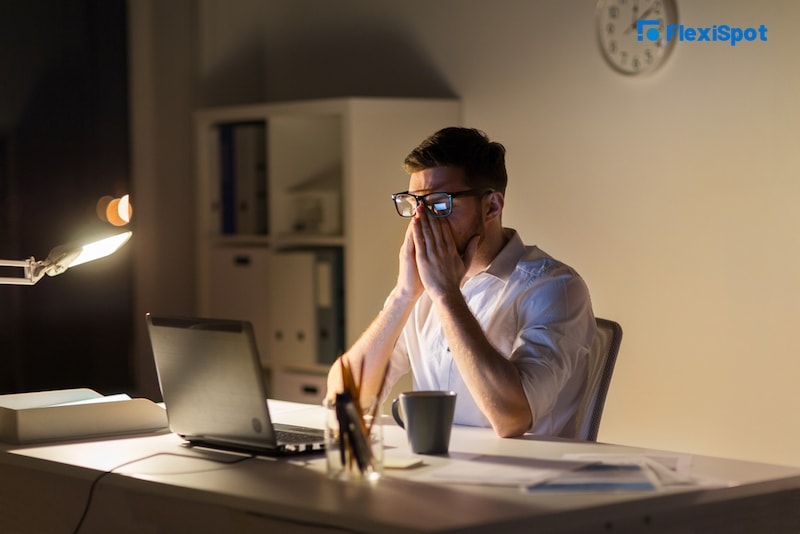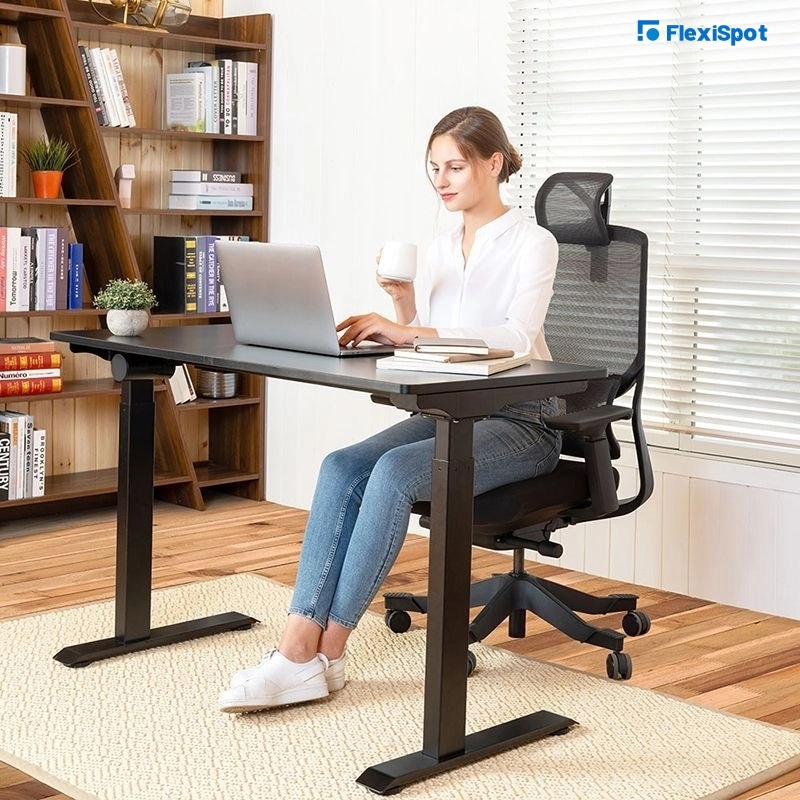You probably spend more than half of your day at work. You're cruising along, getting work done until you start to notice your body slowing down. You're looking for a cup of coffee or an energy drink when your eyes become heavy, and your concentration begins to wander. Otherwise, you're likely to start nodding off at your desk and have to pray that no one notices.
According to the Centers for Disease Control and Prevention (CDC), one-third of Americans do not get enough sleep. According to the CDC, most adults require at least seven hours of sleep per night. An under-rested body would, of course, strive to have its needs satisfied, even if it isn't the most convenient time, such as at work.
If you're lucky enough to have a couch or a workplace R&R area nearby, you can take a quick power nap when fatigue sets in. And there's no reason why you shouldn't. In reality, a growing number of businesses have begun to see the value in allowing (and even encouraging) their employees to take a nap in the middle of the day.
Even so, many workplaces still regard midday sleep as a disadvantage. Some supervisors regard it as laziness. Others see it as a failure to effectively manage your time, both at work and home. After all, a conscientious worker would get enough sleep at night to avoid becoming tired on the job.
Other than getting more sleep, what are the possible symptoms and treatments of office fatigue that we all need to deal with? While it's perfectly natural to experience the frightening afternoon laziness, what happens when it lasts all day, every day? Workplace fatigue isn't just physical exhaustion; it's also mental exhaustion.
Sometimes having the right furniture at the workplace also makes a big difference. For example, a nice, comfortable chair can keep employees from feeling stressed out or tired. Check out this ergonomic office chair that is specially designed with an S-shaped curve to provide added back support.
Not only do you lack energy, but you also lack motivation. It can be challenging to concentrate and keep organized when we're tired like this. It can leave you feeling nervous, unhappy, and on the verge of burnout if it lasts for days or weeks despite enough sleep.
What Is Fatigue? How Does It Make You Feel?
The lack of energy and motivation is referred to as fatigue (both physical and mental). This is distinct from drowsiness, which refers to the desire to sleep. When a person complains of being tired, it's up to the health care provider to differentiate between weariness and drowsiness, which might happen at the same time. Aside from drowsiness, additional symptoms such as shortness of breath with activity and muscle weakness might be misinterpreted with weariness. All of these symptoms can occur at the same moment. In most healthy people, fatigue is a normal response to physical and mental effort, and it can be cured rapidly (in hours to a day, depending on the intensity of the activity) by lowering the activity.
Fatigue is a common complaint, but it's crucial to keep in mind that it's a symptom, not an illness. Fatigue can be caused by a variety of ailments, which can be medical, psychological, or a combination of the two. Fatigue is often a slow onset symptom, and the person may not realize how much energy they have lost until they try to compare their capacity to do things in different time frames. They may mistakenly believe that their exhaustion is caused by aging and disregard the symptom. This could cause you to put off seeking help.
While depression and other psychiatric difficulties may be the cause of exhaustion, it is reasonable to rule out a physical ailment as the root cause. There are three main complaints that people with fatigue may experience; however, it varies from person to person.
There may be a lack of enthusiasm or capacity to begin an activity; the individual tired easily after the activity has started, and the person has mental weariness or difficulties concentrating and remembering to begin or complete an activity.
Anyone can feel exhausted at work, but when you feel exhausted all the time, all day long, it's time to do something about it. Let's look at what causes work weariness and what you can do to avoid being so tired.
Symptoms of Office Fatigue
A variety of factors can cause fatigue symptoms. Sleep disturbances, COPD, heart disease, thyroid disease, diabetes, and anemia are some of the treatable symptoms of weariness.
Fatigue is defined as a lack of physical and emotional energy and motivation. It's not the same as sleepiness or drowsiness, which refers to a desire to sleep. Fatigue is a reaction to both physical and mental exertion. In most cases, exhaustion can be alleviated by resting or lowering activities. Fatigue is a typical symptom of health problems. It's worth noting that it's a symptom rather than a sickness or a health condition. Fatigue is a sign of many disorders, and the symptoms can be psychological, physical, or a combination of the two. The following are some of the most common symptoms of fatigue:
Poor posture due to uncomfortable chairs or desks
Inconsistent work schedules
Sleep deprivation
Change in the pace of work
Tiredness that persists even after a good night's sleep
Hand-eye coordination issues or sluggish reflexes
Problems with short-term memory and inability to concentrate
Vision blurriness or a loss of visual perception
Decreased output
You're making a lot more errors than normal
You’re easily distracted
You're having trouble making decisions
Sleep deprivation or sleep disruption
You may not realize it, but you may be getting too little sleep. This can have a significant impact on your health and concentration. Every night, adults should obtain seven to eight hours of sleep. Make sleep a priority and stick to a routine. Laptops, cell phones, and televisions should all be kept out of your bedroom. Seek medical assistance if you’re still having trouble falling asleep at night. You could be suffering from a sleep issue.
Treatments for Office Fatigue
To avoid the consequences of job burnout, weariness at work – both in remote and office settings – must be handled seriously. What should you do if you've already become exhausted at work and can't seem to shake it? What are some of the do's and don'ts when it comes to dealing with work fatigue? Let's have a look at this article and see what we can learn. You can find yourself less weary and more enthusiastic at work if you incorporate just a few of the following suggestions into your daily routine.
Put your phone away
The continual scrolling on our phones can be incredibly addictive, forcing us to miss out on valuable sleep time. Furthermore, studies have revealed that it disrupts our sleeping cycles, lessening the evident benefits of sleep.
Get comfortable furniture
One of the best ways to prevent fatigue and remain productive throughout the day is to invest in good office furniture. Since office employees are required to sit all day, it is only fair to offer them a comfortable chair. Having a nice, plush, comfy chair will increase efficiency and boost their motivation to work and be more productive. An ergonomic office chair is perhaps one of the best options to help employees reduce stress, which eventually leads to fatigue.
Determine your most productive hours
You can learn to work during the hours when you're most aware once you've determined your body's natural circadian cycle. In simple terms, this entails that you should focus deeply on your work when your energy levels are naturally higher.
Regulations for sleep schedules
Getting less sleep, working longer days, and having less time between shifts are all factors that can be remedied by implementing and following industry rules. Make sure you drink plenty of water. Staying hydrated is essential at work. Keep a bottle of water at your desk and sip it throughout the day. You risk feeling sluggish and lethargic if you are not sufficiently hydrated.
Maintain a healthy work-life balance
Even if you've heard this advice a million times before, the message remains relevant. When dealing with work tiredness, it's crucial to remember to set healthy work-life limits. Even if you sincerely enjoy your job, your mind and body require adequate rest in order to recover.
Work should be left at work. After working hours, don't check your email. Keep in mind that you are not required to be available at your business 24 hours a day, seven days a week (unless specified otherwise). A well-rested and invigorated worker, both physically and intellectually, is significantly more useful than one who is overworked. Being available for work-related demands at all times leaves you with insufficient time to rest, resulting in workplace tiredness.
Multitasking should be avoided
Even if you believe you've perfected the art of concurrently writing emails and participating in a conference call, performing both tasks simultaneously demands more energy. While multitasking, you're not genuinely handling two things at a time because you're constantly flipping back on forth, losing concentration, and increasing fatigue. Multitasking can make you tired since your attention and concentration are always shifting between conflicting demands.
Take frequent breaks
Short, well-placed breaks (particularly those that entail movement) can help you maintain your focus and energy levels. According to research, workers who take short, frequent breaks fight fatigue more efficiently and are more productive than those who do not.
Keep your motivation in check
If you wait for motivation to come, you'll be waiting a long time. Instead, you must design your workspace and your mind such that you can self-motivate. Begin by reorganizing and de-cluttering your workstation to make it more action-oriented. Clutter serves as a source of distraction and demonization. Also, establish rituals and routines to alert your brain that it's time to begin a new task.
Enliven the Workplace
Bright lights at work help people stay attentive, especially if they're working a shift that isn't during the day. Bright lights are indicated to counteract some of the effects of evening tiredness, which increases errors and slows reaction time.
Take good care of yourself
Work tiredness can also be caused by long-term health issues, which should be treated by a medical professional. It's worth evaluating your behaviors if you're confident that your general health indicators are within the required limits. Poor nutrition, lack of exercise, and lack of sleep all have a role in your daily energy levels and productivity at work. Dehydration increases the chance of not getting enough sleep, which directly impacts your performance.
You may feel weak and exhausted if your body is not properly hydrated. As a result, water is critical for transporting nutrients throughout the body and removing waste items. Throughout the day, drink plenty of water and eat nutritious foods. Consider using a hydration app to help you remain on track with your water intake.
Final Thoughts
Protracted duration of feeling exhausted at work can quickly progress to job burnout, which is far more difficult to overcome. It is critical to ensure that you are working in a comfortable environment to reduce stress and improve comfort. Furthermore, the brand-new era of remote work brings with it a new set of issues that, if ignored, can lead to serious work exhaustion. Therefore, employees are required to make special arrangements for their workers in order to accommodate their needs.









